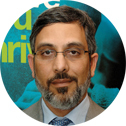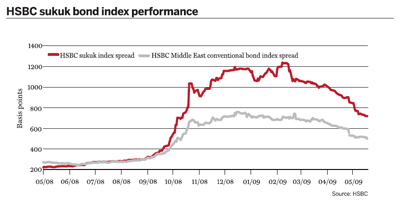Sukuk market faces stern test of maturity
Issuer defaults and high exposure to falling Gulf real estate markets have cast doubt over the stability of Islamic capital markets, but a difficult year could help create a more established asset class in the future. Writer Philip Alexander
Afaq Khan, chief executive of Saadiq
In January 2009, a high-level financial task force set up by the Islamic Development Bank met for the first time in Kuala Lumpur, Malaysia, to discuss among other topics "the architecture of the Islamic financial services industry, with a view to explain its potential contribution to reforming the global financial architecture and strengthening global financial stability". In May 2009, Kuwait Investment Dar became the first Gulf Co-operation Council (GCC) entity to cease payment on a sukuk (sharia-compliant note) due in 2010, as the bank entered default.
A month later, Standard & Poor's (S&P) cut its rating on the Golden Belt sukuk issued by Saudi Arabia's Saad group, and withdrew ratings on the group due to lack of available information. Beyond the Gulf, US independent oil and gas producer East Cameron Partners - which had issued an innovative sukuk secured on gas field revenues in 2006 - filed for bankruptcy in October 2008, prompting a legal dispute over creditors' rights to the sukuk assets.
Rapid growth
These defaults suggest that, behind the rhetoric on the stability of Islamic financing models, the reality is a young asset class that has grown rapidly in the unprecedented period of global economic boom since 2002.
Farmida Bi, a partner at legal practice Norton Rose in London, was a conventional debt capital markets lawyer who was drafted in to work on the Dubai Civil Aviation Authority sukuk in 2004, one of the first large GCC corporate deals, which financed the construction of a second terminal for Dubai International Airport.
"Since then, there has been a huge amount of innovation in the sukuk market without much testing of the documentation or the structures. These new conditions will test the product, and hopefully improve it," she says.
Issuance slows
In practice, core sharia-compliant investors were not directly exposed to the subprime crisis "not by genius or design, but simply because those mortgage assets were not sharia-compliant", says Afaq Khan, chief executive of Saadiq, Standard Chartered's dedicated global Islamic banking unit. But sukuk issuance has not escaped the impact of the global financial squeeze.
Total issuance fell to about $15bn in 2008, from more than $34bn in 2007. Khalid Howladar, senior credit officer for sukuk at rating agency Moody's, estimates that another $30bn in deals were originally planned for 2008, but did not go ahead because of market conditions.
The spread on the HSBC sukuk index, which comprises 37 issues mostly from the GCC, and also from Malaysia and Pakistan, widened by about 1000 basis points (bps) between May 2008 and February 2009, but has since tightened by about 520bps. This price action is encouraging investors to put their money to work in secondary markets, says Mohammed Dawood, director of debt capital markets for HSBC Amanah in Dubai.
Indonesian impetus
So far in 2009, only two large sukuk deals have come to market, both from sovereign issuers. Bahrain has an issuance record in the asset class going back to 2003, and a high A rating. By contrast, the debut issue by speculative-grade Indonesia was a more significant indicator of market sentiment, and the outcome appeared very positive. The $650m five-year issue was seven times oversubscribed, with the three bookrunners - HSBC, Standard Chartered and Barclays Capital - closing the books early to facilitate acceptable allocation sizes.
Fabianna del Canto, head of emerging market syndicate at Barclays Capital, says that there is still significant appetite for sukuk paper, both from dedicated Middle East sharia-compliant investors, and from offshore Middle East or global accounts. But many Middle Eastern fund investors are permitted to take up conventional as well as Islamic paper, so sukuk supply is competing with increased issuance of conventional sovereign bonds from the region, such as recent paper from Abu Dhabi and Qatar.
Issuers themselves are also more circumspect about whether they need to raise the funds in the current economic climate, says Mr Khan. The typical sukuk al-ijara (lease-backed notes) are used to finance capital goods, which often form the reference pool of leased assets from which payments are made to sukuk holders.
"Sukuk is an instrument to raise term capital for expansion in a sharia-compliant manner. So when economies are slowing down, businesses are not buying new plant or expanding capacity, of course it should have an impact on new issuance. This is a positive sign that the issuers, arrangers and investors are being prudent and not misusing the instrument," says Mr Khan.
Underlying credit risks
However, the conservative theory behind raising sukuk has not prevented some issuers building up significant risks. Mr Howladar at Moody's says investment banks such as Investment Dar, or pure real estate finance companies that do not raise deposit funding, are at risk from the squeeze in wholesale funding markets.
And a large proportion of recent sukuk issuance in 2006-08 came from companies with exposure to real estate assets in Dubai and Kuwait, which are now under significant pressure after the bursting of a property bubble. S&P recently downgraded sukuk issues by Dubai Islamic Bank and Sharjah Islamic Bank, both of which have relatively conservative wholesale funding profiles, because of the mounting pressure on their real estate portfolios.
"A lot of the paper outstanding is related to Dubai, but investors have become more comfortable adding exposure to other countries in the region while they wait for recovery in Dubai," says Ms Del Canto.
Jamal Zaidi, chief executive of Bahrain-based Islamic International Ratings Agency, which was founded in 2005 to assess sharia-compliant credit markets, says it is hard to gauge the full extent of distress in the GCC sukuk market, because there are many smaller local currency private deals for which public information is limited.
"We know of at least one sukuk that defaulted in the Bahrain local market, but most of these local market sukuk were not traded in the secondary market and were unrated. They were picked up by banks and locked in the vaults, so if there is a problem it may not come out into the open," says Mr Zaidi.
However, the credit risk is not rising uniformly, says John Sandwick, a Switzerland-based asset manager who set up the Sanad Sukuk Fund in 2006. "Real estate developers like Nakheel in Dubai have had cash flow reduced because apartments are not selling. But there are sukuk from companies such as Tabreed, which supplies water cooling and air conditioning to airports, government offices and factories - these are stable revenue flows," he says.
And in the world's largest sukuk market, Malaysia, issuers are also well diversified, says Zeid Ayer, chief investment officer of Malaysia's CIMB-Principal Islamic Asset Management, which manages at least $500m in sukuk. "We have a lot of infrastructure projects, water, utilities, power, toll roads, so it is not as concentrated on property as the Middle East," he says.
Restructuring challenge
However, investors are watching closely to see how restructuring and recovery play out for those notes that have already entered default, to understand how to price these risks relative to conventional debt.
Only two major international issues, by United Arab Emirates real estate developers Tamweel and Sorouh, involved a true sale of assets into the sukuk special purpose vehicle. These were sharia-compliant securitisation transactions, where creditors can take ownership of the underlying assets in the event of a default even though there is no suggestion that this is a likely outcome.
In other sukuk, the originator agrees to repurchase the assets at maturity or on an event of default. "Most sukuk have only limited recourse to the sukuk assets but in a default situation, the recourse is usually to the purchase undertaking issued by the originator," says Ms Bi. This means that sukuk holders are effectively holding guaranteed bonds whose claims on a default will go into the general pool of claims against the provider of the purchase undertaking.
Mr Dawood at HSBC Amanah is hopeful that the sukuk element of the Investment Dar restructuring can be resolved in an orderly fashion. "The documentation allows for it - the key points are taken from conventional documentation as issuers wanted to ensure that it meets international standards, with some extra documents for sharia compliance. Changing the terms is subject to majority approval, so from that perspective it will be similar to a conventional restructuring," he says.
Many international sukuk are governed by conventional English financial law, where an extension of maturity or reduction in face value on a bond requires the approval of a 'super-majority' of 75% or more of noteholders by value.
But for sharia-compliance, issuers will also need to think carefully about what happens if they cannot get unanimous approval. "Under sharia, there is no problem with two contracting parties changing the contract by mutual agreement. But scholars will be concerned to ensure that minority investors are treated fairly," says Ms Bi.
The process may be further complicated by the diversity of sukuk investors, says Rod Ringrow, senior executive officer for the Middle East at custodial bank State Street in Qatar. "There are conventional bond funds for whom sharia is not a consideration, and private Middle Eastern retail or high-net-worth investors who may not have much experience of restructuring deals," he says.
And in the case of the East Cameron Partners sukuk, there has been a further complication. The sukuk was originally structured as a securitisation of future revenues from a gas field the company was developing. But following its insolvency, the company has filed a court petition to reclassify the deal as a secured loan instead of a 'true sale', which would force the sukuk holders back into the pool of other creditors. This case is pending, and the sukuk is now in default after apparently missing a payment.
Many sharia scholars involved in Islamic finance are unable to discuss the implications of Investment Dar or East Cameron Partners, as they are acting either for the borrowers or their creditors.
But Sheikh Yusuf Talal deLorenzo, a member of the sharia board for the Accounting and Auditing Organisation for Islamic Financial Institutions (AAOIFI), makes the general observation: "All of us are aware that there are lessons to be learned from the experience, particularly with regard to ensuring further protection for sukuk holders. We will work with the legal and issuing teams in the future to get this right."
John Sandwick, Switzerland-based asset manager who set up the Sanad Sukuk Fund
Growing investor base Although the present is uncertain, Mr Ayer of CIMB-Principal Asset Management is more confident about the future from an investor perspective. "I think Investment Dar will lend more clarity going forward. Investors are sitting on the sidelines because of the uncertainty over situations like this, so it should be a case study for investors to see how it spans out," he says.
And Mr Sandwick expects the sukuk market to continue growing significantly, as the number of sharia-compliant investors who need fixed income exposure for regulatory purposes is expanding.
"There are now 12 takaful Islamic insurance companies operating in Saudi Arabia, including foreign giants such as Allianz, and eight licences pending. Plus Saudi Basic Industries, Emirates airlines and National Bank of Dubai have all started final salary pension schemes for their employees in the past year," he says.
Mr Sandwick is in the process of transforming his conventional asset management firm Encore into a full-service Islamic finance boutique. He believes conventional banks are not making the most of asset-based lending, which the Commercial Finance Association estimates could be worth as much as $1000bn worldwide. This financing structure can be easily adapted to the sukuk al-ijara model.
"If you take all the asset-based lending and leasing finance for vehicles, ships, aircraft, white goods and machinery across the Muslim world from Morocco to Indonesia, how many billions of dollars is that? If even a small portion was set aside for sukuk, it would transform the market," he says.
Local markets
In the GCC, Mr Dawood expects the development of sukuk markets in local currencies, as issuers learn the lessons of the sudden squeeze on dollar liquidity. "Already, 30% to 40% of local investors in these countries are sharia-compliant, so it makes logical sense that as local markets develop, sukuk will lead," he says.
He is already seeing a high level of enquiries from potential issuers in Muslim countries that have not yet developed sukuk markets, such as Egypt, Morocco and Turkey. And Mr Zaidi at Islamic International Ratings recently met with the Sudanese financial authorities, who are keen to strengthen their Islamic financial system.
Beyond the Muslim world, other emerging markets that have suffered from the fall of investment flows from the US and western Europe are looking to the sukuk model. Pemex, Mexico's state oil monopoly, which has struggled to raise financing despite its investment grade, is apparently considering a sukuk to finance the purchase of about 10 oil tankers from South Korea. Officials from Brazil's Petrobras apparently also visited the Gulf recently to sound out Islamic investors.
In addition to building supportive legislative frameworks in these countries, Mr Ayer says the quality of market information also needs to improve.
"It is difficult to get consistent and sustained data for international sukuk issuance, which can make portfolio management challenging," he says.





